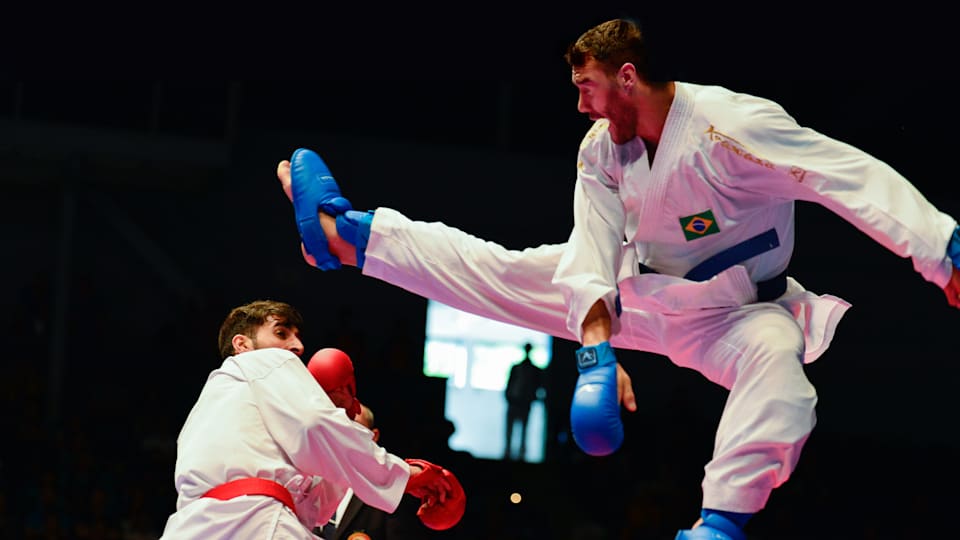World Karate Day: Celebrating the sport’s Olympic debut
Today, (17 June) is World Karate Day, created by the World Karate Federation in 2017 to celebrate the sport’s inclusion at the Tokyo 2020 Olympic Games. In 2016, it was announced that karate would be one of five new sports to be included on the Olympic programme.

The long journey to the Games
Karate’s journey to the Olympics has been a long one, with attempts to have the sport included beginning in the 1970s. Symbolically, the sport will make its debut in its home country, with the competition taking place at Nippon Budokan.
Nippon Budokan is still considered to be the spiritual home of martial arts by practitioners and enthusiasts, 50 years after it hosted the first Karate World Championships in 1970. Inaugurated in 1964 for the Olympic Games, the Nippon Budokan is located in Kitanomaru Park and has a capacity of 15,000.
The origins
Karate – which means ‘empty hands’ in Japanese – originated on the island of Okinawa during the Ryukyu Dynasty (1429-1879), where it was used by soldiers to fight and defend themselves as they were not permitted to use weapons. The sport was introduced to the Japanese mainland in the 1920s, before university students created competition rules in the 1950s in order to use the techniques they had learned. By the following decade, karate had been introduced around the globe by Japanese instructors.
Karate consists of kata — where athletes demonstrate one of the 102 recognised series of offensive and defensive movements — and kumite (sparring). For kumite, there will only be three categories for men and for women at Tokyo 2020, as opposed to the usual five categories for international competitions like the World Championships. In addition, for each Olympic category, only ten athletes are allowed to compete.
Making karate accessible to the public
Many people at the Olympic Games will be watching karate for the first time and, as such, efforts are being made to ensure everyone in attendance understands what is happening.
“We will do our best and will have people describing what is happening. This is the best way to teach the public. The scoreboards will also be animated, so they understand what we're doing,” explained Chairman of the WKF Referee Commission Javier Escalante.
The (new) Road to Tokyo 2020
After the postponement of the Olympic Games Tokyo 2020 and in agreement with the International Olympic Committee, the World Karate Federation revised the Qualification System for the Karate competition at the Olympic Games.
Before the Olympic Games was postponed, it was announced the 40 highest-ranked athletes had already qualified. However following recommendations by the IOC, this decision was reverted to include missed opportunities which could not have occurred due to the coronavirus outbreak. The final list of 40 athletes to compete at Tokyo 2020 will not be announced until May 2021.
Japan are taking their host quota for a total of 8 athletes, while 32 places were allocated to the four highest-ranked athletes per gender in each of the Olympic categories. There are 40 more athletes yet to qualify for Tokyo 2020.
Who to look out for
Two of the athletes hoping to win gold in Tokyo are five-time world kumite champion Rafael Aghayev of Azerbaijan, and reigning world kata champion Sandra Sanchez of Spain.
In the kumite -67kg category where World Champion Steven Da Costa is currently ranked top, the fight for the first ever gold medal is set to be an epic one: "The competition will be very tough. Being the reigning world champion will mean nothing. We’ll all be equal and anything could happen. I don’t even know if there will be any favourites."
Chinese 2018 -61kg World Champion YIN Xiaoyan is very excited about karate’s debut at the Olympic Games telling Tokyo 2020: “After so many years of effort, finally we can make our dreams come true on the Olympic stage!”
As with other athletes across the world, Iranian Bahman Askari (-75kg), had to alter his preparations significantly due to the COVID-19 pandemic, but his confidence is high: "The coronavirus lockdown forced me to stay home, however I trained individually to keep my fitness. I am counting down the minutes until I will start my training with my teammates. I will make a huge effort to win the best medal in the Olympics.”
In an exclusive interview with Tokyo 2020, Venezuelan two-time world champion Antonio Díaz expressed his willingness to extend his career by one more year in order to compete at the Games.
“I have waited 20 years to be able to participate in the Olympic Games, I can wait one more," he said.
“I have had several moments when I have thought about retirement. But I think the Olympic Games, the most important sporting event, and especially happening in Japan, the land of karate, is the perfect place to end it.”
